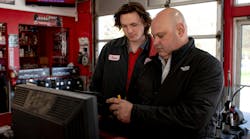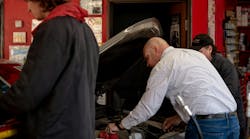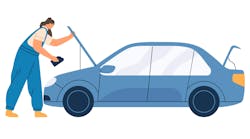“We like to think of ourselves as a customer service company that happens to fly airplanes (on schedule, with personality and perks along the way). How may we help you?” —Southwest Airlines
“Consumers are statistics. Customers are people.” —Stanley Marcus, president of Neiman Marcus
What business are you in? If you answered automotive repair and maintenance, you might want to think about being in the customer service business. A great marketing plan with an irresistible offer can convince a consumer to try your service, but it is always the customer experience that brings them back.
Most companies have excellent training programs for the services they perform. Many hire ASE-certified mechanics to perform the more difficult services. But do you teach customer service? Do you empower your team members to make decisions?
A few years ago, I bought a shirt from Nordstrom on a trip to Seattle. It soon became my favorite shirt, and I found myself wearing this shirt as often as possible. A few weeks later when I returned home, I decided I wanted another one. I went to the local Nordstrom to look for the shirt. I kept looking and was soon approached by a sales clerk who asked how he could help me. I told him I was looking for a shirt just like the one I purchased in Seattle. We spent a few more minutes searching the store to no avail. My shirt just wasn’t there. Rather than tell me, “sorry we don’t have it in stock,” he suggested we look in their catalog. We found the shirt, and I asked when it would be in stock. I was told because it was September they would not be reordering summer shirts until next spring. Seeing I was disappointed he asked me if he could order it for me. “Wow, you can do that?” was my surprised response. “Of course,” he answered. I quickly said, “yes,” and thanked him. Next came the real surprise — when he asked for my address and told me they would mail it to me. When paying for the shirt I asked about the shipping charge. I was again surprised when he told me there would be not be a shipping charge.
My experience is just one example of why Nordstrom is famous for their customer service. This entire experience was performed by the sales clerk, not the store or department manager. This kind of customer experience can only happen in a company that values customer service and empowers their associates to the make necessary decisions to care of their customers.
What happens in your shop when a customer has a problem? Maybe a service needs to be redone or a refund is needed. Are your associates empowered to make these decisions or is only the store manager or district manager allowed to make these decisions? If it is only the manager, what happens when he/she is not there? Is the customer told to wait or come back later? If so, this is not the kind of customer experience that would bring them back again or encourage them to refer you to their friends.
When was the last time you were face-to-face with one of your customers? Too many executives and owners spend their time behind the desk reviewing statistics. You should be in your stores often, talking with your customers. Hang out in the customer lounge, listen to what they are saying to each other.
Not too long ago, I was having my car serviced at a quick lube when the technician came in and asked another customer to step outside with him so he could review a few items with him. As soon as the door closed, another customer turned to me saying this where they try to sell additional services you don’t need. He then added, “I never buy anything else.” Opinions matter, especially to your customers. His past experiences left him feeling as if they were selling, not consulting or advising. Even though he had returned for his oil change, he still did not trust them enough to have other required services performed. Trust is the most powerful word in the automotive service industry. Without trust there is no relationship. Whether it’s marriage, friendship or business, you must establish trust first. Would you marry someone you did not trust? Could you have a best friend that wasn’t trustworthy? Of course not, and you certainly wouldn’t let someone work on your car if you didn’t believe they were capable of preforming the service correctly.
Establishing trust can begin even before the customer comes in for service. Every business has a reputation of some kind. As the above example shows us, people talk. This customer was warning me I was about to be sold something I didn’t need. What would happen if this same customer was asked by a neighbor for an automotive repair recommendation?
All of us have met someone for the first time we felt very comfortable with right away. It may have been their appearance, body language, the way they spoke or what they said. Most likely, all of these factors played a role in the level of comfort you experienced upon meeting them. You’re now thinking they could become a friend, maybe even a best friend. This is what was missing in our above example. Their customers were simply customers.
Most shops do a great job of servicing the vehicle, but what kind of service are we giving the customer? I worked with someone a few years ago who refused to use the word customer in his stores, instead they were guests. Can changing just one word make a difference? I think so. A customer is a person who buys goods or services from a store. A guest is a person who is invited to visit a home or take part in a function organized by another. I like the use of the words “invited” and “home” in the guest definition. Just think what could happen if consumers thought your marketing efforts were not ads but invitations to visit your business home. If we viewed customers as guests, would we greet them differently? Would our expectations be different? If we measured our success by how many guests came back again rather than how much they bought today, would your retention results change? I think so! Now we have a store culture where we have invited guests whom we treat like friends.
Of course, there is a significant amount of training that must be done. But words matter; start with changing the words. The change must start at the top. Owners, managers and supervisors must make the change. Stop asking your team how many customers came in today or worse how many vehicles came in. Instead ask your team how many invited guests came in today. How many friends did we make today?
Last Impressions
“If you do build a great experience, customers tell each other about that. Word of mouth is very powerful.” —Jeff Bezos, founder and CEO of Amazon
Now let’s put the icing on the cake!
When my dinner guests are leaving my home, I always walk them out to their car to say good bye. My mother always put a lot of effort in her goodbyes. She would tell me you never know when this might be the last time you are together.
Don’t miss the chance to leave a fantastic last impression. Don’t be like so many shops that as you leave the cashier they point you to your vehicle out in the lot. Always walk your guest out to their vehicle. Take this opportunity to thank them for choosing XYZ service center, open the car door for them and invite them back. I even know of one quick lube company that opens the car door for their guest and then rolls out a red carpet for them to step on as they enter the vehicle. The customer usually smiles or says something they think is funny, like “you treat me like I’m a king” as they enter their vehicle. This becomes a powerful lasting impression. No one is excited about taking time out of their day to have their vehicle serviced. It’s not like going out to eat at your favorite restaurant or watching a good movie. But if they leave with a smile on their face, or maybe even a little laughter, the chances they’ll return have greatly improved.
There are many other opportunities to impress your guests during their visits: at checkout, during your friendly service review or just having a small conversation while they’re waiting in the customer lounge.
Guests who feel like they’re friends become your brand advocates. They become your best marketing tool, because they talk about you because they want to, not because you paid them.
Start today to change your company from an automotive service company to a friendly customer service company.
Now, go make some friends.





